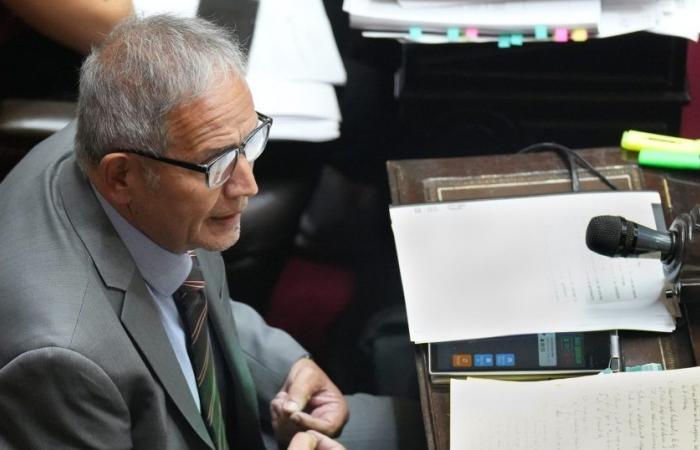The Fiscal Package is about to become, for President Javier Milei, not only law, but also the story of the good pipe. As in the children’s joke, the project with which the Executive seeks to reinstate the Income Tax for workers, among other issues, always seems to hide one more twist. After the comings and goings between the Casa Rosada, the deputies and the senators, the Judiciary will now enter the scene. And, if the Lower House reinstates the tax after the Senate’s rejection, there are at least 67 union organizations that will appear in court to claim the unconstitutionality of the decision.
“Of course we are going to prosecute it if they move forward with the sanction. They are creating a tribute by the will of only one of the Chambers,” the head of the Banking Association and national deputy of Unión por la Patria, Sergio Palazzo, responded bluntly to Cenital’s query. Bank workers are among the highest paid in the country. Today, 45% of them pay the schedular tax established less than a year ago by Congress, when Earnings for Workers was eliminated. If Profits were restored now, 80% of the bankers would pay.
The decision to judicialize the reinstatement of the tax is supported by the Salario no es Ganancia Trade Union Table, which brings together 67 unions, among which – in addition to the Banking Union – the Federation of Oil Workers and Ginners, led by Daniel Yofra, stands out. that has carried out mobilizations and strikes in opposition to the sanction of the Bases Law, of which they mainly criticize the labor reform and the Large Investment Incentive Regime, and the Fiscal Package.
According to Government estimates, with the reestablishment of the Income Tax the number of workers who pay taxes would be multiplied by five. Almost a million more people would be covered by the tax and would be added to the 195 thousand who pay the schedular tax today. For both the Casa Rosada and the provinces, reinstating Profits would be a vital income of funds at a time when collection only appears to be supported by the COUNTRY Tax. For this reason, despite the rejection in the Senate, the Executive and the deputies of the ruling party and allies (PRO, UCR, We Make the Federal Coalition and Federal Innovation) promote the reinstatement of the chapter that the Senate rejected by 41 votes to 31.
The window to judicialization is open from a discussion that divides constitutionalists and legislators regarding whether the elimination of a chapter in a project (as the Senate decided regarding Profits) is a simple modification, reversible by definition, or is a rejection that prevents the other Chamber from resuming the discussion. The ruling party and its allies are among those who think first, along with Professor Ricardo Ramírez Calvo, professor of the Department of Law at the University of San Andrés. According to Ramírez Calvo, “the reviewing Chamber (in this case, the Senate) lacks the powers to partially leave without treatment a bill that is sent to it by the Chamber of origin (Deputies). Therefore, in those cases, the lack of treatment is equivalent to a particular rejection and the House of origin has the power to insist on the original text of the bill.”
At Cenital we care that you understand. That’s why we set out to tell a complex reality in a simple way. If you like what we do, help us continue. Join our circle of Best Friends.
But the unions that will see how their workers are affected by the reinstatement of the Income Tax believe otherwise, supported by some weighty voices, such as that of the constitutionalist Andrés Gil Domínguez; the former Secretary of Legal and Technical of the Presidency Vilma Ibarra; and the former legislator and member of the constituent convention Jorge Yoma, among others. The latter starred in a hilarious exchange on the social network “Dear Jorge, you have to read article 81 of the Constitution,” he recommended to the Riojan, who with great malice responded: “Martín, brother, I don’t need to read it. “I wrote it.”
The deputy of We Make the Federal Coalition Nicolás Massot introduced a nuance yesterday. As he evaluated, “this law can be insisted on with the Income Tax and the Personal Property Tax because they were part of the file that was generally approved in the Senate, regardless of whether later in their turn in the respective chapters and articles did not obtain the majority to be approved in particular.” The result, everything indicates, will be in the hands of the Judiciary, which will extend the time for a definition that the International Monetary Fund has been insistently demanding from the national government.


